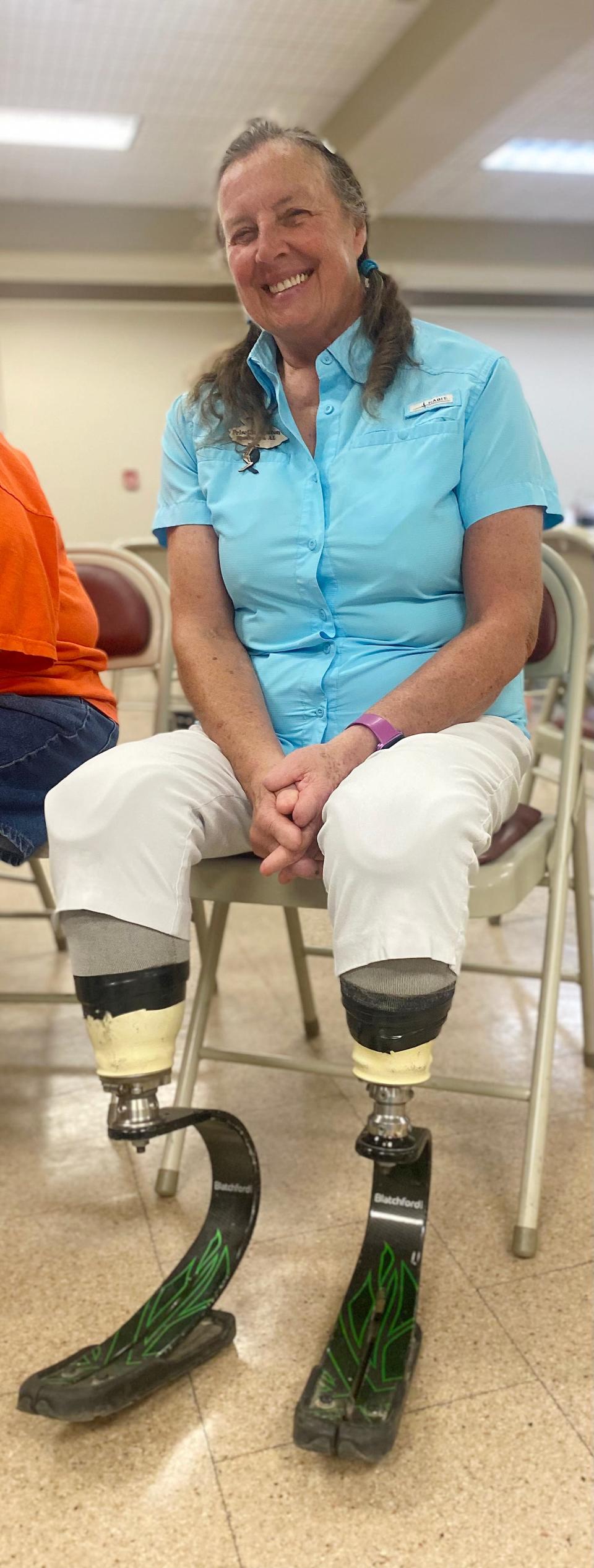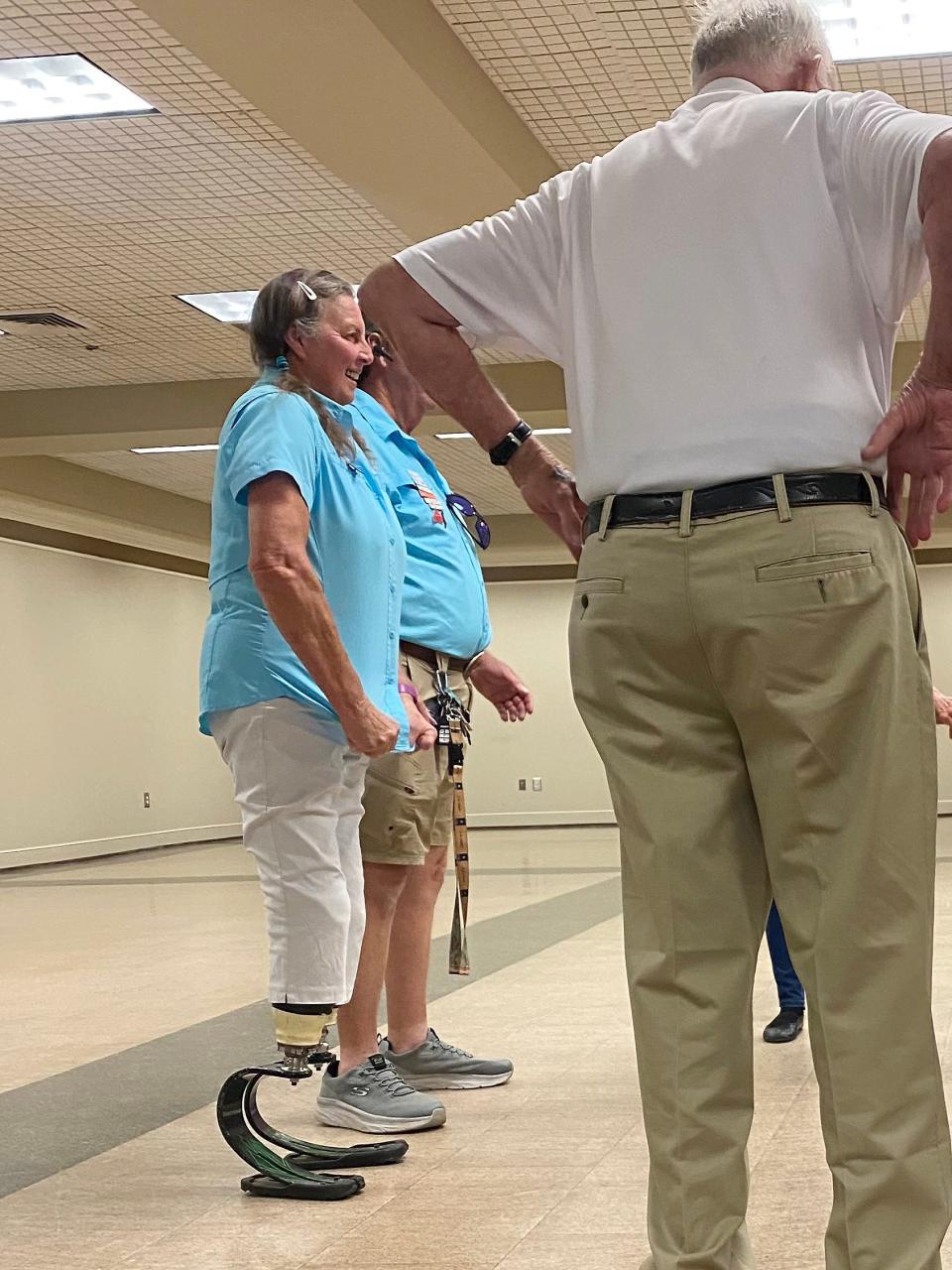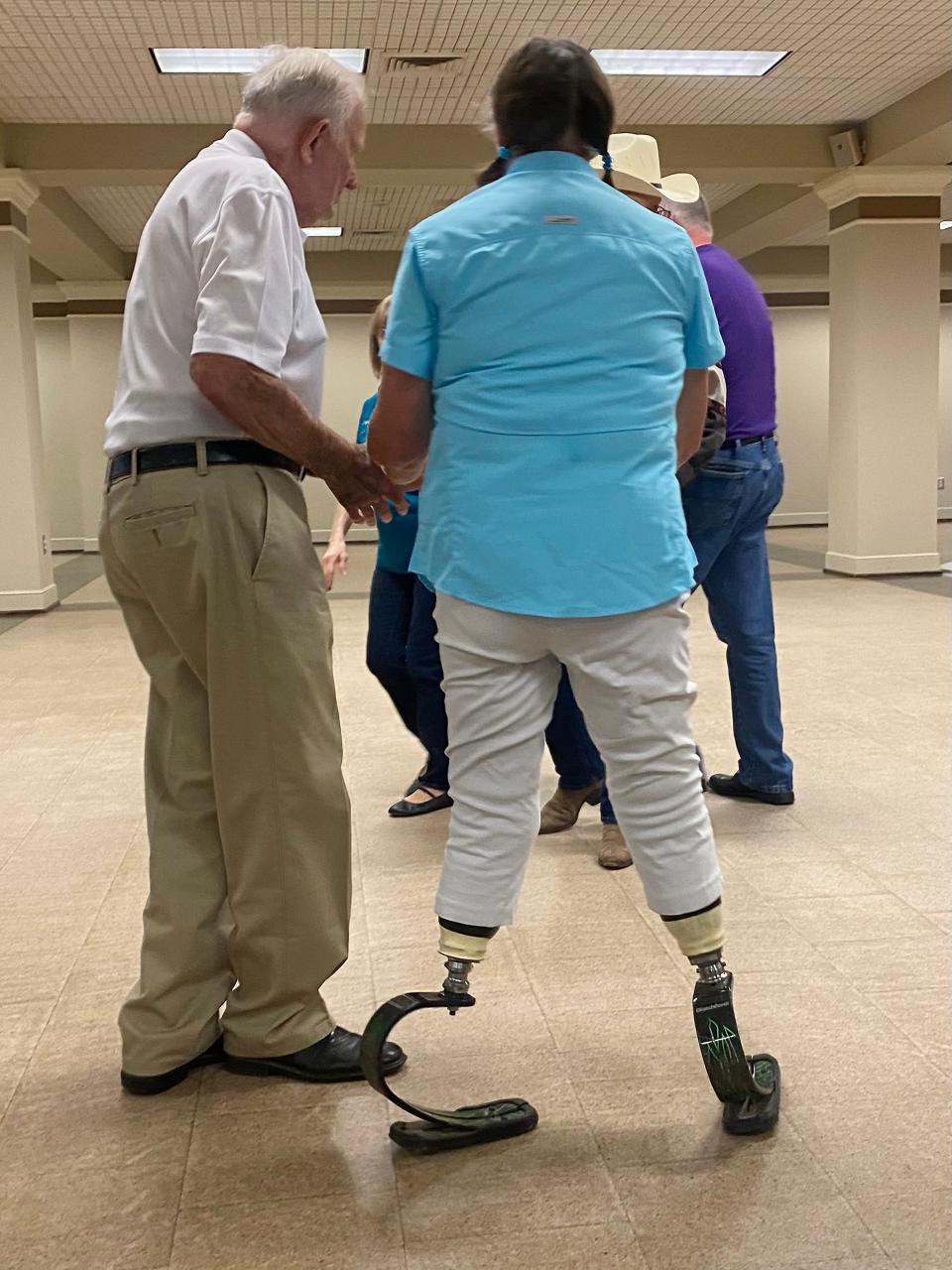WHEN HARRY MET: Priscilla Newton, who square dances on prosthetic blades
- Oops!Something went wrong.Please try again later.
- Oops!Something went wrong.Please try again later.
Lately, I’ve been watching Fred Astaire movies — some with Ginger Rogers, another with Judy Garland (“Easter Parade”) and one with Cyd Charisse (“Silk Stockings”). I’ve also been watching Gene Kelly musicals like “Singin' in the Rain.”
I really enjoy watching dancing, whatever the style. Tap dancing may be my favorite, but ballet is enjoyable, too. I just wonder, while watching closely, “How do the dancers do all those steps?”
I have participated in, and written about, square dancing. I thoroughly enjoy watching and listening as the men and women (of all ages) respond to the caller’s sing-song voice, spelling out the various steps needed to perform the different dance patterns.

On a recent Thursday evening at Gadsden’s Downtown Civic Center, I became aware of one dancer who spun and twirled, gliding effortlessly through the various dances as if she were ice skating. She was so smooth, even when her partner swung her high.
Then, I noticed her legs — she had no feet.
The dancer was on blades known as transtibial prostheses, which replace legs and feet that have been amputated below the knee.
My wonder and questions grew — dancing on blades?
During a break between dances, Priscilla Newton shared her incredible story.
She’s a bit shy of 72, was born and raised in the Birmingham area, and is a product of their schools. After graduation, she worked in various jobs in an 18-year period before answering a "Help Wanted” ad posted by the state of Alabama.
Newton was hired to work with the blind and deaf in and near Jefferson County. She learned to read Braille so she could easily communicate with her clients. She excelled in the field and ultimately began working at the Alabama Institute for the Deaf and Blind in Talladega, spending 11 years with that program.
Then, a rare illness in January 2011 almost took her life.
Newton was comfortable explaining what happened, and her smile and demeanor during our interview revealed no discouragement. In fact, she seemed to glow as she spoke.

“I went to see my doctor, thinking I had the flu,” she said. “The condition got worse, and I began to have purple splotches all over my body. I lost feeling in my hands and feet; I was a sick woman.”
She had a sick husband at home, on oxygen and with a PICC line installed, so she called her sister to take her to the hospital. She recalled that she was so sick she couldn’t get out of the car — “My legs wouldn’t work” — and had to be taken into the hospital in a wheelchair.
“After that,” Newton said, “I don’t remember anything.”
She was in full organ shutdown and was placed in a drug-induced coma for more than a week. When she woke up, she found her hands were clenched, her fingertips were dying and her legs were weeping.
“After being given medication,” Newton explained, “all the blood and oxygen rushes toward a person’s vital organs and their extremities are on their own.”
She had meningococcal disease, caused by the bacterium Neisseria meningitidis, which has a high mortality rate if untreated. Two representatives from the Centers for Disease Control and Prevention in Atlanta visited her, but they couldn’t figure out where she got it from. “I guess I was just the lucky one,” she said.
Newton faced a critical decision that only she could make. “It was my decision: amputation immediately or go home to die,” she said. “I really didn’t have a choice.”
Her legs and feet, from the shins down, and her fingertips had to come off because of all the skin that had died, plus she had “27 wounds all over my legs that were purple.”
She almost lost a lip as well, “but it came back.”
Newton’s smiling face maintained its glow as she told what happened next. “... After the surgery to remove my fingertips and feet ... I literally felt the presence of the Lord in a way I have never experienced before,” she said. “He had His arms around me, holding me. God has been with me all the way. I knew everything was going to be OK.”
And nine months after the surgery, she was back square dancing. “As soon as my wounds healed and I was fitted (with prosthetic devices), I was up and out and I haven’t stopped,” she said.
Newton first was given traditional prosthetics so she could walk again. She adapted to them and quickly learned to walk and dance with them attached, but she fell about once a week. So, her medical team made a change, fitting her with blades about eight years ago (at a cost of about $3,500 each).

After that, she said, “I was good to go.”
The blades sit in a socket and are held on by a suspension sleeve. “I’m blessed. I cook, I cut grass, I can even drive (with hand controls on her vehicle),” she said. “I’ve just learned to work with what I’ve got.”
Newton said she’s gotten “tremendous support” from her family, including her church and square-dancing families.
And after the evening’s dance was over, she left to spend the night at the Noccalula Falls campground, where more square dancing was on the agenda for Friday.
Harry D. Butler, a former broadcaster, is a motivational speaker and author of “Alabama’s First Radio Stations, 1920-1960.” Butler periodically sits down with someone of note, then brings the conversation to readers.
This article originally appeared on The Gadsden Times: Losing feet hasn't stopped Gadsden square dancer

